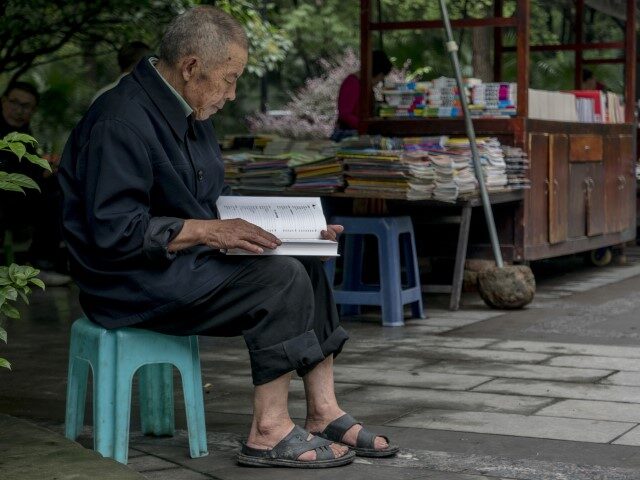The Chinese Ministry of State Security (MSS) revealed a major intelligence breach on Thursday – the discovery of piles of confidential military documents for sale as scrap at a recycling facility to any passerby for less than three dollars.
The MSS, which established an account on the regime-controlled WeChat online platform last year to pressure civilians into heightened vigilance against alleged threats to the Communist Party, announced that two individuals in charge of disposing of military documents were “dealt with” in response to the incident.
According to the state-run Global Times, the documents were discovered in an undisclosed part of the country by an elderly man named Zhang, who happened to be walking by the recycling facility and saw what appeared to be military documents for sale. Zhang “enjoys collecting military reading materials,” the Global Times detailed, and bought four books for $0.83, or six yuan, out of curiosity.
“When Zhang returned home and started carefully reading the books, he found they were with marked with words such as ‘classified’ and ‘confidential’ and suddenly realized that these materials may be related to state secrets,” the state newspaper detailed. The documents were described as “brand new,” meaning that they did not include outdated military information but, rather, highly sensitive and currently relevant information.
The Chinese government applauded Zhang for notifying Communist Party authorities “without hesitation” and said an investigation is currently ongoing into how the documents arrived in the possession of the recycling center, available to any interested party at a low price.
As of Thursday, two individuals identified only as “Guo” and “Li” have faced government punitive action for taking actions that resulted in the release of the papers. The two people allegedly worked at a “military-related unit” and sold the papers to the recycling station. They were not identified as soldiers and the Global Times report did not indicate that Guo and Li intentionally distributed the confidential documents. Instead, the report described the pair as having “a limited awareness of confidentiality and had attempted to save themselves trouble” by selling the papers instead of properly destroying them.
The Global Times report ominously concluded that the two employees were “duly held accountable,” without elaborating.
The South China Morning Post noted that the announcement of the discovery also came with a call to action to all Chinese citizens to be vigilant, as Zhang had been, and help the state protect sensitive materials and prevent foreign intelligence-gathering. The MSS launched its official WeChat account in July 2023 with the intent of becoming a more forceful presence in the public consciousness, demanding that all companies and Chinese individuals work to benefit the ministry. The debut on WeChat also followed major amendments to China’s “Counter-Espionage Law” intended to create a more pervasive security state and weaponize Chinese citizens against hostile foreign entities.
“All state organs and armed forces, all political parties and all people’s groups, enterprises, and other social organizations have an obligation to prevent and stop espionage activities and maintain national security, according to the revised Counter-Espionage Law,” the Global Times proclaimed following the debut of the MSS WeChat account.
The Global Times described China’s current state as one of “severe and complex counter-espionage.”
The amendments to the Counter-Espionage law also follow the imposition of regulations in 2021 to expand “education” of the general public regarding espionage. The new mandates required “social groups, enterprises, and public institutions” to adopt the same security measures as government and military entities to combat espionage, including training all employees in how to spot and prevent espionage attempts.
The Chinese government has endured several embarrassing revelations of confidential information in the past five years, though many of them were the products of intentional leaks or hacks, not of accidental leaks. One of the most influential document dumps occurred in 2022, when Dr. Adrian Zenz of the Victims of Communism Memorial Foundation (VOC) published what is now known as the “Xinjiang Police Files.” The files included a trove of information on Uyghur concentration camp victims, confidential speeches and other documents with statements from senior Communist Party officials, and other evidence indicating that the genocide of the Uyghur people in East Turkistan is deliberate and was ordered directly by dictator Xi Jinping.

The documents were allegedly first obtained by hackers in 2018 and later provided to the VOC.
In February, another release of over 570 documents appeared online taken from the security firm I-Soon, revealing that the firm worked closely with the Chinese state to spy on dissidents or hack into foreign corporations. It was not clear from the release of the documents who procured them or how they ended up online, nor whether the dump was the product of an internal leak or a hack.
I-Soon’s victims, according to the document leaks, including NATO and several foreign governments – including those of Taiwan, South Korea, and India – in addition to known anti-communist dissidents.
Follow Frances Martel on Facebook and Twitter.


